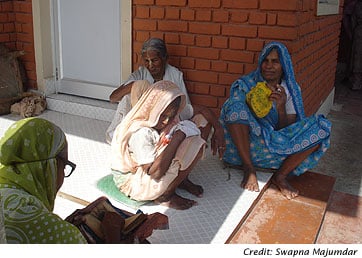
 NEW DELHI (WOMENSENEWS)–Widows facing financial deprivation and ostracism in their villages continue to gravitate to the temple town of Vrindavan, in the largest state of Uttar Pradesh, to literally sing for their supper, finds a Nov. 29 study.
NEW DELHI (WOMENSENEWS)–Widows facing financial deprivation and ostracism in their villages continue to gravitate to the temple town of Vrindavan, in the largest state of Uttar Pradesh, to literally sing for their supper, finds a Nov. 29 study.
The study of 500 widows between the ages of 24 and 75 finds that while the women face numerous hardships in Vrindavan, many say they are happier there than in their villages, even if it means living on the streets. Ninety-one percent of the widows live off alms and charity doled out by nongovernmental organizations and individuals donors, found that study, which was conducted by the New Delhi-based Guild for Service with support from UNIFEM.
While the munificence of the city and its spirituality are major attractions for living in Vrindavan, the widows also enjoy freedom from domestic responsibilities, social constraints and the persecution they face in their villages after becoming widows.
Almost a third of those surveyed–28 percent–said they were expected to adhere to customs traditionally followed by widows in their villages, such as shaving their hair, wearing white clothes and shunning all auspicious occasions. In many parts of the country widows are barred from partaking in marriages and festivals or entering places of worship as they are considered ill omens.
Facing Less Discrimination
Widows living in Vrindavan and the adjoining areas in Mathura district, the study finds, face less discrimination than in their villages. For example, many are allowed to enter temples and some even attend important ceremonies.
However, the study also finds that while many of the women receive rice, money and clothing in lieu of chanting the name of God for a few hours in the morning and in the evening, they remain paupers financially. Many of the widows live on far less than the $1-a-day the World Bank and Indian Planning Commission say defines the poverty line. In addition to singing, the little money they get comes from sources such as charity, pension, domestic work, tailoring and candle making.
India is estimated to be home to 40 million widowed women.
The Uttar Pradesh government estimates 21,000 widows live in and around the Mathura district. But that number is only based on women who collect state pensions, so the actual numbers of widows in the area is widely assumed to be much higher.
Food, No Shelter
The widows have plenty to eat, the study finds. More than 70 percent of them eat the Indian staple diet of rice, chappaties (Indian bread), dal (lentils) and vegetables three times a day.
But many have no shelter. One-third live on the streets, railway stations and bus stops, forced to face the harsh summers and winters without adequate protection. About two-fifths said they had no access to toilets, having to squat in the open.
The majority of the widows were found to be illiterate, which has hampered their ability to access entitlements such as widow pension, ration cards for subsidized rice and other government schemes benefiting women.
But the widows’ attitudes about themselves and their future is starting to change. The study finds that some have stopped shaving their heads, many are wearing pastel-colored saris and some younger widows are open to the idea of remarriage.
It is this freedom that prompted one of the widows to use the Internet and ‘Google’ her way to a widows’ home in Vrindavan.
Would you like to Comment but not sure how? Visit our help page at https://womensenews.org/help-making-comments-womens-enews-stories.
Would you like to Send Along a Link of This Story?
https://womensenews.org/story/equalitywomen%E2%80%99s-rights/101130/indian-widows-swell-temple-filled-town
Swapna Majumdar is based in New Delhi and writes on gender, development and politics.
For more information:
Guild of Service:
http://www.guildofservice.org
Ministry of Women and Child Development:
http://wcd.nic.in/
Workers News on Emergency Fund Extension:
http://www.putworkersfirst.com/content/tanf-emergency-contingency-fund-extension
National Commission for Women:
http://ncw.nic.in/


